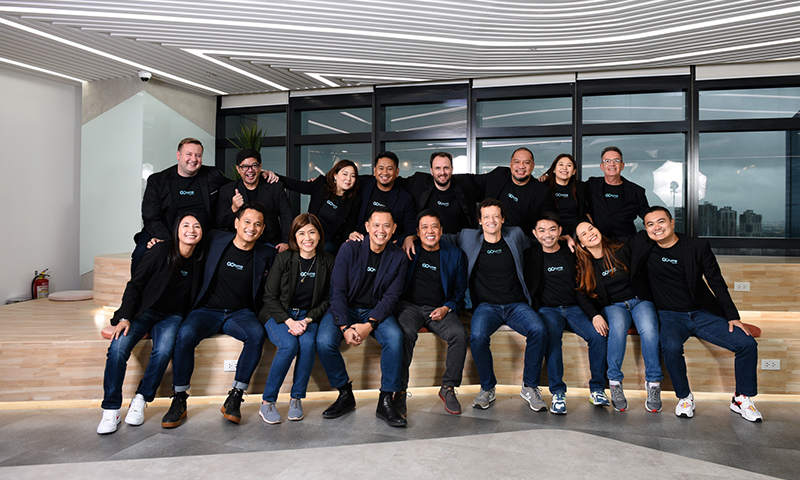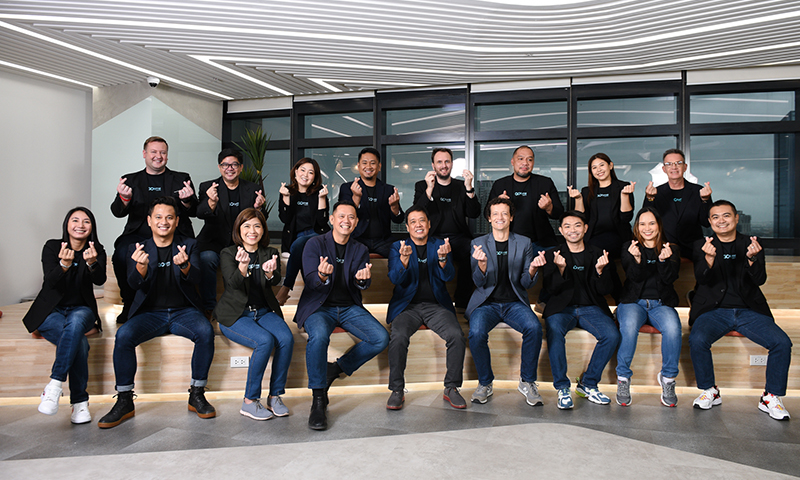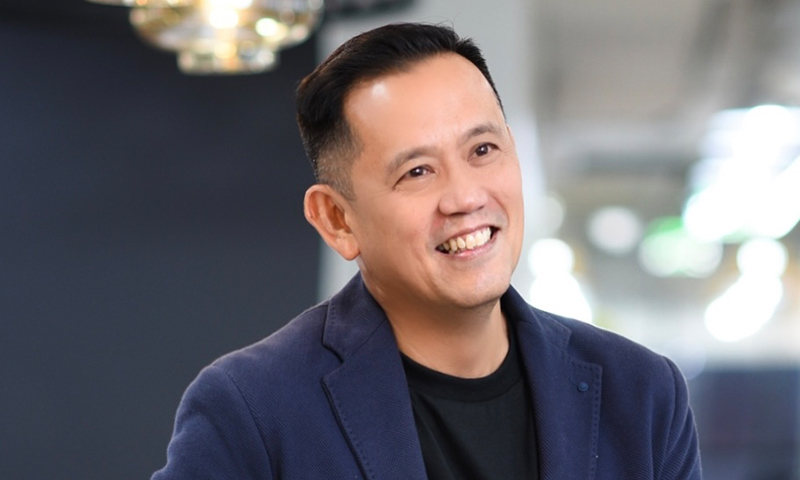Building FinTech from scratch
Albert has several years of experience in fintech, banking, telecommunications and logistics. He started his career in logistics after working for American President Lines and Federal Express. He expanded his knowledge and experience by moving into telecommunications with two major Philippine telecommunications companies, Globe Telecom and Smart Communications. While at Globe, Albert received Globe’s Leadership Award for significant gains made in growing and expanding broadband services across the country. He transitioned from telco to fintech after being tapped to lead GCash as president and CEO. During this period, Albert became the founder of the Philippine E-Money Association. Immediately prior to joining GoTyme, he was SVP, Digital Payments and Agency Banking for Robinsons Bank. Albert holds a Bachelor of Science degree in Hotel and Restaurant Management from the University of the Philippines and completed the Oxford FinTech program from the University of Oxford Saïd Business School. He is also a certified coach from the International Coaching Federation.
1. Tell us a little about your journey in the world of FinTech. How did you become who you are today?
Steve Jobs said: “You can’t connect the dots looking forward, you can only connect them backwards. So you have to trust that the dots will somehow connect in the future. You have to trust something – your gut, fate, life, karma, whatever.”
Fintech was not at the forefront of my mind. In fact, my background before fintech is spread over 23 years in telecommunications, air and sea freight transport and logistics, especially in sales and operations. The experience I gained from there gave me the confidence to take on fintech when I was appointed CEO of a local EMI (Electronic Money Issuer) or e-wallet provider. I relied on the execution expertise, rigor, discipline and people management experience I learned across different fields and applied these to my initial foray into fintech. I took advantage of using a new point of view that was not very common in the financial industry at the time. From there, I quickly embraced the champion of financial inclusion, which became my north star for using fintech to help my fellow Flipinos.
2. As CEO of GoTyme, what motivated you to become an entrepreneur?
Let me first say that GoTyme is unique in the sense that we operate with two CEOs, or rather, co-CEOs. I’m one half of that equation, the other is Nate Clarke.
Furthermore, I would not say that I am an entrepreneur in the truest sense of the word, since my career was built on several multinational and local organizations. These organizations served as my learning foundations for general management and springboards for execution innovation. When I entered the fintech space, my motivation was built on a strong desire to build something from scratch, something I could call my “own”, something that could contribute to a greater good. I also felt that by pivoting into start-ups it would be easier to introduce disruptive products and processes. I didn’t have a solid plan to become an “entrepreneur”, but more of a drive to change the “usual way” of doing things.
3. How has GoTyme performed in recent years?
GoTyme received its digital banking license from the Bangko Sentral ng Pilipinas in August 2021 and commercially launched in October 2022. As of this writing, we have only been in operation for three months. In that short period of time, we have successfully introduced a new way of account creation, leveraged a retail chain for deposits and withdrawals and incorporated three times the point value every time a GoTyme account holder uses their GoTyme card to pay.
To standardize account origination, we implemented digital onboarding kiosks in Robinsons Supermarket, where grocers could easily open an account by completing a digital onboarding process assisted by a bank ambassador and collecting their debit card in 5 minutes.
The same person could then continue to deposit money into their account (or withdraw money) by redeeming through the supermarket to points assisted by cashiers. Once funded, he could purchase items in the Robinsons Retail chain and earn 3x the points on his GoRewards membership integrated into his GoTyme account. He could use the same points to buy more items or redeem those points for cash.

4. What is your personal vision for the company?
I look forward to the day when Filipinos have adopted and integrated our products and services into their daily lives, so that GoTyme is no longer a noun but instead a verb. When you send money, growing investments, lending and other financial services are all about “Go-Tyme-ing” it.
5. Share a milestone that changed your professional life for the better.
Early in my career, I turned my back on a well-paying job because I was pressured to compromise my principles. My three children were still very young then, and the first thing on my mind was how to support my family. For almost a year, I continued to swallow the humble pill, doing small, odd jobs, but never giving up on finding a job more closely related to my field. That experience taught me the importance of family support and the power of prayer. I quickly learned the values of humility and cruelty. The two values that I have the highest, and are among 2 of the 5 values we support in GoTyme.
6. Do you think cash will soon be obsolete? Is digital currency the future?
Personally, I don’t think cash will ever become obsolete. Its use will decline, as was the case during the pandemic. However, as the lockdowns and restrictions are eased, cash transactions, especially with the unbanked and underbanked, are also making a comeback. That said, digital accounts opened during the pandemic will remain an alternative to cash. Digital currency will be a choice, and how it thrives will depend on its ubiquitous acceptance and ease of use.

7. Many people today still lack access to FinTech services. How can we improve the situation?
Let me focus on the Philippines. To speed up access, I think we need to; (1) accelerate the distribution of the national ID card, and (2) align policies across relevant government agencies to make it easier for SMEs to do business. The first addresses the need for real verifiable identification for everyone to open financial accounts. It also becomes a means of ensuring that accounts are safe and secure.
The second is helping to rapidly expand an ecosystem of merchants that can accept digital payments for small pyramid transactions. By doing so, customers are not only educated through simplified use, but also open up to other digital financial services. Which in turn perpetuates the digital transaction cycle.
8. What are some of the challenges we face in FinTech today? Do you see a solution in the future?
TRADITIONAL REGULATION – as FinTechs continue to push boundaries, regulation is inevitably left behind and needs some time to catch up. It is incumbent on fintechs to carefully understand existing regulation and the spirit behind it. It is important to carefully determine how these regulations are best applied to new products and services and to new distribution methods, so that existing financial services, data protection and privacy laws are not compromised.
CYBER SECURITY and DATA PROTECTION – there is no doubt that cybercriminals will target fintechs to gain access to customers’ sensitive information, so staying ahead of the curve is a must. While technology can be used to combat these threats, we cannot underestimate the criticality of open collaboration and cooperation between fintech players, traditional financial service providers and regulators.
PRODUCT OR SERVICE DIFFERENTIATION – the temptation to differentiate on price is strong, but it is not sustainable and loyalty to the product is low. Stickiness comes from solving a pain point by leveraging new technology. Customers are also wary of digital per se and look to human intervention and connectivity.
ATTRACT AND RETAIN THE RIGHT TALENT – while financial rewards, benefits and perks are big drivers for attracting talent, building an employee-centric and purpose-driven culture are strong reasons to stay.
9. Tell us about your college life. How did you discover your interest in Fintech?
Fintech wasn’t a “thing” when I was in university. I started with delusions of grandeur as a chemical engineer and eventually finished with a degree in hotel and restaurant management. At the time, no part of me considered a career in finance. Looking back, I realize that the dots connect and make sense, as my logical analysis and problem-solving skills come from my time spent at the College of Engineering, while my people and service orientation is a result of my shift into hotel and restaurant management. But so early on I started looking for new ways of doing things and using technology to make it possible. I remember building simple coded engine stops just because I found the ones on the market too expensive and too complicated for the car I was driving at the time.

10. What advice would you give entrepreneurs in FinTech today?
I guess the first thing would be to always keep the customer in mind. Create a customer journey that is simple, flexible and easy.
Second, be aware of the trade-off between building and buying technology. Study carefully and know when to do what.
Third, understand the compliance rules for the product or service. Financial services are heavily regulated, and it is a must to know all regulatory obligations.
Fourth, go with a financial model that is right for your business. Understand your unit economics. Consult with experts or those who have experience from the same industry.
Content disclaimer


